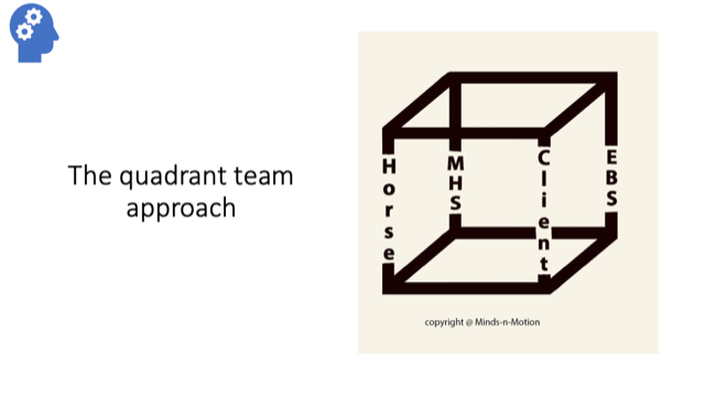
Equine Assisted Traumatherapy with a Psychodynamic Perspective (pEATT) Module 1 Part 2 - Who is this training for?
If you have completed or are in the process of finishing pEATT 1:1 and want to learn more about the essentials in Equine Assisted Traumatherapy the components that affect, support and interfere with the practical application of what you have learned, then this course is for you.
Please do not enroll unless you have taken Module 1 Part 1.
We welcome you to join us as we delve deeper into the topics and expand them step by step through examples, case studies and step by step analyses.
Welcome to Module 1: Part 2.
pEATT 1:2 focuses on the essential components of Psychodynamic Equine Assisted Traumatherapy and its Practical Application. In this course, we look at the elements of working with trauma, how to structure sessions, what to look for to ensure a „safe" environment for all. Taking a first look at complex PTS(d), we focus more and more on the horse, to highlight what the horse, as equal team member with respect for his/her differences, actually contributes to sessions. We will then delve into the practicalities and the practical application of what you have learned. Throughout it all, we go deeper into the equine team members and start to challenge some preconceived notions about interacting with them.
Cost: 515,- Euros (taxes and fees apply)
pEATT Curriculum
PEATT 1:2 is part of a certification curriculum in psychodynamic Equine Assisted Traumatherapy consisting of 4 Modules.
Module 1, part 1 +2 are offered online:
pEATT 1, Part 1: The Fundamentals of psychodynamic Equine Assisted Therapy.
pEATT 1, Part 2: The Essentials of psychodynamic Equine Assisted Traumatherapy and its practical Application
You will receive a Certificate of Attendance for each Part you complete. If you attend and pass both Module 1 Parts, you will receive a Certificate of Completion. This Certificate of Completion is necessary for you to attend any other Modules in pEATT.

Trauma
Defining and Working with trauma,
incl. complex-PTS(d) and dissociative "dis-orders".

Case Analysis
Look at the tools and building blocks learned in Module 1
in detailed, step by step a case analyses.

Team Work
Teamwork within the facilitation team is crucial for the outcome of any interventions.
Course Curriculum
- VIDEO: Introductions and Definitions (14:16)
- DISCUSSION BOARD: pEATT - What is a Model?
- VIDEO: TRAUMA - A "Felt" Experience (6:03)
- VIDEO: Why this Song? A "Felt" Experience (14:37)
- VIDEO: Trauma Definitions and Diagnostics (36:43)
- VIDEO: Back to the Horses: What can Trauma look like in pEATT? (10:35)
- DISCUSSION BOARD: Trauma Definitions and Diagnostics
- VIDEO: 2nd Case Example (17:47)
- VIDEO: Dissociation (19:08)
- VIDEO: A Psychoeducational Model (33:47)
- DISCUSSION BOARD: Trauma and Psychoeducation
- VIDEO: Screening Questionnaires and Treatment Phases (33:46)
- DISCUSSION BOARD: Treatment Phases

Attention Returnees!
We honor your previous attendance to any formerly known pEATT Part 1 and Part 2 and will give you a 50% discount for those parts you previously attended.
Please contact Ilka at ilka.parent@mindsnmotion.net for your discount coupon.
Ilka Parent, Clin. Psychotherapist,
Depth Psychology, Psychotraumatherapy (DeGPT)
In the past 30 years, my clinical focus has been on specializing in traumatherapy, be it combat related aspects or complex PTS(d).
In the equine assisted field, I have a worldwide network, organize regular international symposia on equine welfare in equine assisted practices, and publish both textbooks and articles on the topic of traumatherapy with horses on the team.



